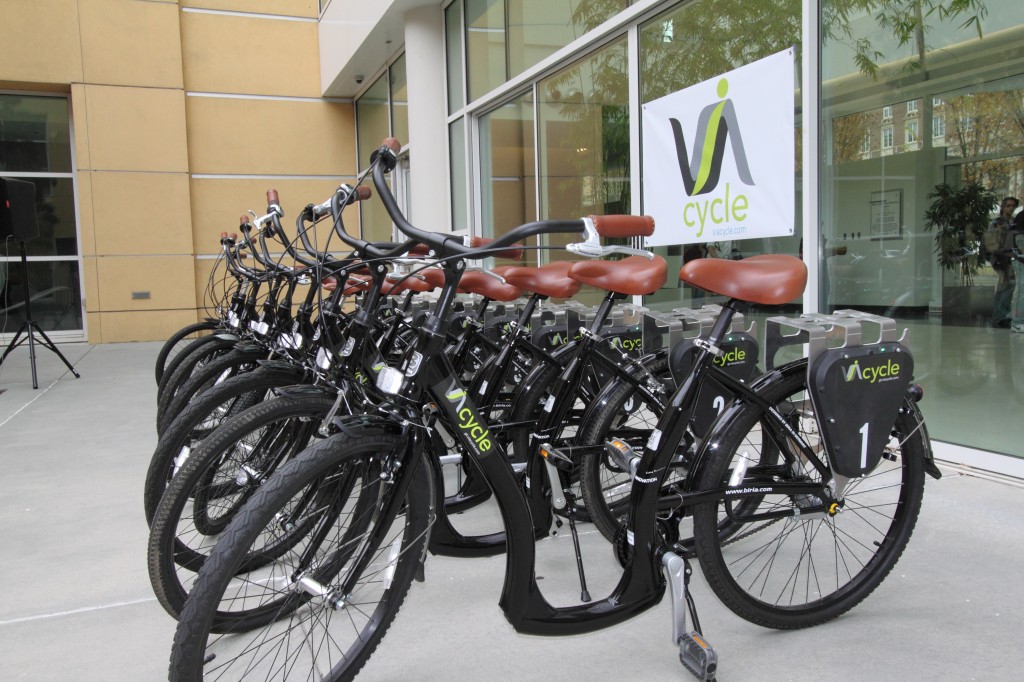viaCycle Brings Shared Bikes to San Francisco Powered by SMS and Voice
Time to read: 3 minutes


Living in San Francisco, you see a lot of bikers on the road – it’s one of the most efficient ways to get around the city. But what if you’re not ready to invest in a bike, or maybe friends come to visit and you’re stuck driving across town to find a bike rental?
viaCycle wants to change that by making bike sharing simple and accessible. Sid Doshi, CTO of viaCycle founded the company with a few of his Mechanical Engineering Grad friends at Georgia Tech in 2009 – which became their very first customer.
Quickly realizing the challenge of the logistics and hardware around building a bike sharing program, the team built an electronic lock system powered by Twilio SMS and Twilio Voice, that also includes GPS tracking. Find the bike, call or text in the PIN, and you’ve got a sweet two-wheeled ride to enjoy the day on. We ask Sid a few questions about the story behind viaCycle and what’s next for the company.
What is viaCycle?
viaCycle creates bike-sharing systems that allow users to quickly checkout bikes for short trips using their cell-phones. It’s like Zipcar, but for bicycles. We set-up turn-key bike-sharing programs for universities, corporations, mixed use developments, neighborhoods etc.
What is the backstory of your project?
viaCycle started as a student project at Georgia Tech. All the founders are former or current Georgia Tech grad students. A couple of us were doing research on urban transportation, and bike-sharing was the latest trend that caught our eye because it was enabled by technology. This was in 2009.

A year later, in 2010, we applied for the same grant again ($50k this time) to develop a new bike-sharing system that would get around most of the issues by completely getting rid of stations.
Since then, we’ve developed the product and brought it to market. Not having stations cuts down costs per bike to 1/2 or 1/3rd of existing bike-sharing systems, while at the same time allowing more flexibility in set-up and operations.
We now operate and manage a program for Georgia Tech as a vendor. We are starting at another school in September, and we are looking to start more programs for companies, universities, resorts etc. in the near future.
What is your team’s background?
All our founders are Mechanical Engineers with Master’s degrees. One is actually still completing his PhD. We were part of the Sustainable Design and Manufacturing program where Kyle, our CEO, and I did our graduate research on Multi-Modal Urban Transportation for the Ford Motor Company, so we are familiar with the territory.
How are you using Twilio?

Our bikes can be unlocked via Voice/SMS/App. We use Twilio for the Voice and SMS access. In fact, we didn’t even have smartphone apps when we launched, and they are still in beta.
Voice/SMS is important for us, because to develop a system that is truly accessible, we cannot be dependent on smart-phones, and Twilio allows us to bridge that gap without having to build/support/scale any telephony infrastructure.
What other technologies are you using to build/support it?
We use a basic web application stack (Django/Postgres) for back-end stuff. A lot of our technology is actually in electronics, we design our own PCBs, and mechanical design a lot of custom components, though the web stack ties it all together.
How did you get started developing with Twilio?
We were looking around for the best way to connect SMS to our web application and thus to our bikes, and researching Asterisk and related options, trying to find something that was as hands-off as possible while still being very cheap.
We weren’t having much success. We were looking into setting up phone lines, or connecting a cell phone to an on-site server etc, this was in April 2011. Then a friend at another startup mentioned Twilio. We had the entire setup running in 2-3 days from then, and it didn’t cost us anything. It was like a part of the required infrastructure just fell into place.
What are your next steps with viaCycle? Any new cities you’re targeting next?
We are staring at another school soon with a 20 bike program. We are also working on the next version of our product. Currently, we are focusing most on bringing viaCycle to more places.

Learn more about viaCycle here.
Related Posts
Related Resources
Twilio Docs
From APIs to SDKs to sample apps
API reference documentation, SDKs, helper libraries, quickstarts, and tutorials for your language and platform.
Resource Center
The latest ebooks, industry reports, and webinars
Learn from customer engagement experts to improve your own communication.
Ahoy
Twilio's developer community hub
Best practices, code samples, and inspiration to build communications and digital engagement experiences.


